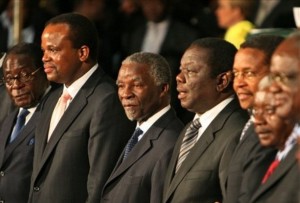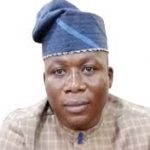Transforming Africa’s Image in the 21st century-what options?
Columnists, Latest Headlines, Steve Orji Monday, January 20th, 2014
By Steve Orji
A prominent feature of colonised people is the washing away of their important identities in the course of time. Even their self-belief.
Identity has much more to do with the intangible attributes of a people than with only their facial or personality peculiarities.
Identity cuts deeper into the root and essence of a people.
By colonisation, I mean, the advent of “Whiteman’s” rule over its subject people, especially in Africa, to which the British may have set out with all the brilliant intentions of “bringing civilization” to a “dimmed, darkened people”.
Identity or the people’s self-image, almost always suffers a collateral damage whenever a people get colonised.
The dominant Image of contemporary Africa seems to be the one of poverty, a consequence of complicated social and political experiences inspired by incompetence of the managers of the continent. Perhaps, alongside another silent but no less a big factor; western conspiracy and manipulations.
Something profound must take place within Africa’s psychology, not only to restore its fledgling image, but for it to be able to exert an authentic influence on the world.
China and India is proof that a colonised people can equally succeed.
Roughly half a century after their independence from Japanese and British colonisers, China and India, would against all forms of imperialist controls and subtleties, rise from the lurch of a broken state, to both forge strong and dynamic cultural and economic identities, bringing to rest long-held stereotypes, about third world countries not being able to initiate and sustain meaningful development imperatives.
India is already an industrial economy, coasting neck to neck with other established western economies. China its twin miracle state is gone past most advanced countries, well reckoned as the second largest economy in the world.
These success stories both engender profound respect for the image of these nations, and should serve as revolutionary models for peer nations of Africa.
The myth must be laid to rest which holds that for success to be real and authentic must be couched in the mould of western traditions.
Singapore’s leap from being a tiny desolate patch of British estate into a first-rate world in a space of less than four decades serves a good example. In his book, From third world to first, Lee Kuan Yew, the prime minister of Singapore writes: “Our climb from a per capita GDP of US$400 in 1959 to more than US$12,200 in 1990, and US$22,000 in 1999 took place at a time of immense political changes in the world”
A contrasting but saddening economic descent instead took place in Africa. Martin Meredith, in his book, The state of Africa, he observed: “By the end of the 1980’s, after a decade of structural adjustment, little had changed for the better. Africa was slipping into its own bleak category. Per capita income in Black Africa, with a population of 450million, was lower than it had been in 1960. Growth per capita during the 1980s contracted by an annual rate of 2.2 per cent. External debt tripled, reaching $169Billion, a sum exceeding gross national product….”
There is no doubt that one of the perils of colonisation is the bitter historical residue it leaves on the psyche of its victims, the cultural and image burden it dumps on their collective psychology.
But, enough of the colonial ranting.
Africa like the mythic phoenix must rebirth, it must course through the fog of its historical distortions to prop a fresh start, a powerful break from the normal course.
Such revolutionary march must come at a price.
Africa would fundamentally need lots of inspired courage and sense of superior creative enterprise to wean itself from the strings of western dictations and influence. China, Singapore, India…did just that. It works!!!
The image and identity Africa bears is better interpreted within the hearts of Europe and other places where Africans scurry for daily bread.
First, how are Africans perceived? How a people are perceived gives an idea of the identity or image of the continent to which they regard as home. This ultimately begets the treatment they receive.
Africans are first of all, abjectly needy people. A people who live in shanties, afflicted by the world worst epidemics, whose governments are either not working or badly broken.
Africans are those who must survive, even when it means living off hand-outs from the western world. Africans are mauled and hurled like beasts in Europe and elsewhere, they do the dirty jobs.
They have been criminalised by the hostile social climates they live in. Africans are hate objects-they are often seen to represent the continent of war, corruption, civil upheavals, poverty…
The common people of Africa, who trot the earth to eke a living, bear the brunt of the failures of their own continent, and they better understand the pains they bear.
What options is there for Africa?
The infightings within the continent are already a major point of resource haemorrhage for a continent that has so far lost immense goodwill from the world. Regional frameworks like the African Union should put its act together to achieve and sustain regional political and economic cooperation, able to foster peace and prosperity for its people.
Africans should be made to love what they have-sport their own handiworks and make it known to the rest of the world with a sense of pride and dignity.
Building an industrial economy will bring along with it the discipline of living within the means of one’s national resources, by supporting local enterprises and discouraging excessive inflow of foreign goods. Africa requires a technology springboard through a start-from-scratch technical and vocational initiatives at all levels of learning.
Africa’s leaders must build civic and social infrastructure, to curtail frivolous social and medical trips abroad.
Who can tell how much Africa can save if corruption is checked and halted? If leaders refrain from stowing away stolen funds in foreign lands? If corrupt African leaders must be brought to book, the world would also make notes on their books.
Would the world not treat the rest of Africans as thieves, when their leaders with stained records, are seen around the world, walking free?
African schools and institutions should enshrine rigid codes of excellence in their mission charter, ensuring that merit is never sold or bought by the rich.
A people’s image is not measured by what they hope to do or what they say of themselves.
Image is how you live and what you live for. Africa can begin to transform its image by taking these small steps, even this late in the day.
Related Posts
Short URL: https://www.africanexaminer.com/?p=7445























